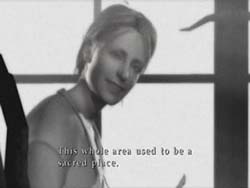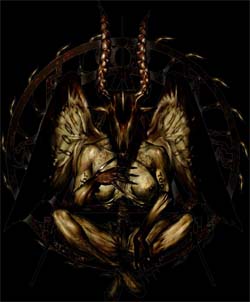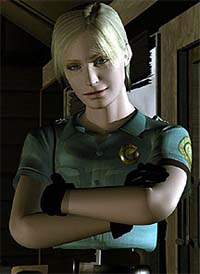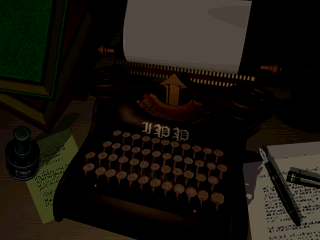
In one of my earlier posts titled "'Silent Hill' is NOT about 'repressed guilt'; it's about occultism!", there seemed to be some misunderstandings about the interpretations that I offered. For one thing, reader Malik commented:
"I have to disagree. The series has never established the cult as the basis for the goings-on in Silent Hill. It is never explicitly stated that the cult or Alessa are the true source of the supernatural power ..."
The commentor is correct on that point. Though, I don't think I ever said that Alessa and the cult were the ultimate source. If you got that impression, then there might have been a misunderstanding or miscommunication, and I apologize for not being clear. To be clear: I was arguing that the plots of the game were focused on the cult and Alessa, and how they affected this supernatural power -- not that the cult is the cause of the power. I thought about responding with my own comment on that original post, but I felt that it would be more appropriate to just write a new blog article about it, so that I could spend more time exploring the town's history, as it was established by the original creators. So, Malik, I hope you read this. and I hope it makes more sense. I'd love to hear your feedback.
Please note that much of this post is speculation. The games themselves provide very little concrete information about the extended history of the cult and region -- especially prior to the Civil War. The following is all retroactive explanation and may not represent the original intentions of the creators. This will be my own, personal opinion and interpretation regarding the nature of Silent Hill's otherworldly power.
The Place of the Silent Spirits
I never intended to imply that the cult and Alessa created the supernatural phenomena, nor that they are the power's ultimate source. I agree that the power likely existed (in some form) far prior to the events of the first game.

Mary refers to Silent Hill as a "sacred place".
Mary's comments regarding the place being "sacred" in the past implies that early inhabitants (probably the Native Americans) were aware of the supernatural effects of the region going back hundreds - maybe thousands - of years. Since the Natives saw the place as being "sacred" and beautiful, I tend to believe that the power did not originally manifest demons or project people's nightmares onto reality during these periods of history. Instead, I would imagine that the force (whether conscious or not) would have been more benign - maybe even benevolent.
We don't know much about the natives' beliefs prior to the arrival of European colonists, and what little we do know is possibly clouded by the lens of the European colonists and cultists.
Based on what is known about real-world Native American beliefs, it is probably safe to assume that the natives of the Toluca Lake region would likely have worshipped any regional supernatural power as "ancestral spirits" or as "spirits of nature". The Book of Lost Memories can be found in Silent Hill 2 after beating the game, and it supports this idea and tells us about the nature spirits:

"They called this place 'The Place
of the Silent Spirits'. By 'spirits',
they meant not only their dead
relatives, but also the spirits that
they believed inhabited the trees,
rocks and water around them."
- Lost Memories book (Silent Hill 2)
The name "Place of the Silent Spirits" may simply be an innocent callback to the game's title, or it could be a significant clue. The fact that the spirits were "silent" implies that the natives were not able to talk to it; or at least, the spirits did not talk back. This implies that the "spirits" are probably not a conscious entity. Even though it can apparently react to the thoughts - and even desires - of the people it comes in contact with, it may not have an intelligence or will of its own (which I explained in my earlier post about repressed guilt)... [More]
643444f5-4ba4-4d6c-818b-921ecc1c7154|8|5.0
Tags:Silent Hill, Silent Hill 2, Silent Hill 3, Silent Hill 4: the Room, history, cult, occult, black magic, religion, spirituality, Christianity, Satan, god, Native Americans, Glooscap, Otherworld, paradise, Maine, colony, Civil War, colonial America, Toluca Lake, tourism, drugs

I was going through the comments on my posts a while back, and I came across a doozy of a comment by user Maiden T. I'm not going to replicate the entire post here, but you can review the comment at the link provided. In summary, the commenter asserts that Silent Hill, as a series, was never about occultism, and that all the games were "repressed-memory morality tales". The first Silent Hill and "to an extent the third one" are the exceptions (according to Maiden T).

Totally unrelated image of a demon god...
My mind just about exploded when I read this comment, and I started typing up a response, only to realize that I had written a whole blog's worth of counter argument. So, I decided to just turn it into a new blog. I'll continue my series of analysis and interpretation articles about Silent Hill with a write-up about how the series is most definitely about occultism.
What is Silent Hill about?
I've already tackled two topics that I consider to be common myths about Silent Hill. The first was about the over-sexualization of Pyramid Head, and the second was about the realness of the Otherworld. Now I'll address one of the most fundamental misunderstandings about the series: what is it about?
The repressed-inner-demon myth
Probably the most core and fundamental myth about the Silent Hill series is the continued propagation of the idea that the series (as a whole) is about characters dealing with repressed inner demons - typically a repressed memory of guilt over a perceived sin which they have committed. This idea is rooted in the popularity of Silent Hill 2. It is so pervasive, that the designers and producers of newer installments of the series embrace it, while dismissing the other critical elements of the other games' stories:
"[My favorite SH game is] Silent Hill 2. I didn’t really care for all the heavy occult based storyline in SH1 and 3. I felt SH2 had the best stand alone storyline, and provided the best atmosphere of all the SH games by far.
[...]
I find all the in’s and out’s of ‘The Order’ to be overly intricate and rather uninteresting, but that’s just my opinion."
- Devin Shatsky (producer, Shattered Memories, Downpour), in an interview with Hell's Descent (Nov 5, 2010).
The reason that Silent Hill 2's design was so successful (and unique within the series) is because SH2's excellent atmosphere was based around feelings of melancholy and depression rather than fear and threat.
Exploring a character's personal guilt and depression works great when the entire game is designed around that central, unifying theme! It doesn't work quite so well when ... [More]
04f88e94-11ac-43f4-beb3-1cd282060bf0|19|4.1
Tags:Silent Hill, Silent Hill 2, Silent Hill 3, Silent Hill 4: the Room, Silent Hill Origins, Silent Hill Homecoming, Silent Hill Downpour, Silent Hill Shattered Memories, Team Silent, Konami, cult, occult, fan fiction, horror, Harry Mason, Alessa, Dahlia Gillespie, Cheryl Mason, Heather Mason, James Sunderland, Red Pyramid Thing, Pyramid Head, Claudia Wolf, Vincent Smith, Henry Townshend, Walter Sullivan, Travis Grady, Alex Shepherd, Shepherd's Glen, Murphy Pendleton, ritual, Flauros, demon, god, Mary Shepherd-Sunderland

Stumbled onto this Gamefaqs forum topic about Masahiro Ito "confirming" that the Good ending of Silent Hill is canon, and that Cybil is supposed to die. Many fans apparently see this as absolute validation of their dogmatic opinions on the topic, and that to argue otherwise is moronic. I don't understand why there is so much vitriol thrown towards people who support the Good+ ending and Cybil's survival. Why does the fanbase want Cybil dead so much?
There are three key arguments that I hear in defense of the "Good is the only canonical ending" position:

Why do fans want Cybil dead?
- Harry wouldn't have known what the Red Liquid does until after he sees Kaufman use it on Alessa, and so he couldn't have used it on Cybil earlier.
- If Harry used the Red Liquid to save Cybil, then he couldn't have had any left over to solidify into the pendant for Heather.
- Cybil does not appear in any subsequent Silent Hill. She is not referenced in SH3, and in Silent Hill Homecoming, Deputy Wheeler refers to a female police officer who went to Silent Hill and never returned. Clearly, this means that Cybil is dead.
To many fans, these three arguments are bullet proof! At this point, they've practically become gospel (along with Pyramid Head's well-known rape antics).
But how well do these arguments really stack up to scrutiny? Let's play Devil's Advocate...
I'm going to start with Masahiro Ito's comments on the issue:
On Mashiro Ito's Twitter feed, he "confirms" that Cybil is dead.
[More]
94751804-81b6-4eed-b2d7-5732686eda1e|13|4.8
Tags:Silent Hill, Silent Hill 2, Silent Hill 3, Silent Hill 4: the Room, Silent Hill Homecoming, Konami, Team Silent, Masahiro Ito, Hiroyuki Owaku, Keiichiro Toyama, Cybil Bennett, Harry Mason, Cheryl Mason, Kaufman, Lisa, ending, red liquid, aglaophotis, pendant, possession, occult, Good vs Good+

I've heard that a lot of players are complaining about the save system of Capcom's new Resident Evil 6. I haven't played the game yet because RE5 sucked, and the demo for RE6 sucked, so I can't comment on that game. What I can do, though, is take a moment to reflect on the genius of the classic Resident Evil save system.
Most of my readers know me as a Silent Hill fan [boy], so it's uncommon for me to heap praise upon Resident Evil. But I actually am a big fan of the original game (it was one of my favorite PlayStation games). Maybe some day, I'll get around to writing about how Resident Evil 4 killed my interest in the franchise...

Would you like to save your progress?
[YES] NO
Resident Evil took a unique path in terms of it's save-game system. I'm not sure if it was the first to use this particular style of system, but it was definitely one of the best implementations that I played!
During the PSX era of the late 90's, game saves generally took one of 3 forms:
Resident Evil falls firmly in that last category, but with one significant (and game-changing) caveat: in addition to only being able to save at pre-defined locations, the ability to save was also tied to a consumable inventory item! [More]
11efae01-91a1-4c73-9ff1-8965e9a48534|9|4.2
Tags:Resident Evil, Resident Evil 5, Resident Evil 6, Shinji Mikami, save, save system, autosave, checkpoint, survival horror, resource management, typewriter, ink ribbon, Silent Hill, Amnesia: the Dark Descent

One of the greatest strengths of the early Silent Hill games - developed by internal Konami studio Team Silent - is their exceptional character design. The characters presented in these games are among the best in all of gaming history at illiciting emotional responses from the players - both positive and negative.
It all starts at the top, as the protagonists of all three games stand tall and proud as paragons of game character design. This blog will contain major plot spoilers for Silent Hill 1-3. Read at your own risk!
Having relatable and likable characters is essential to the success of just about any horror story (whether in the form of a book, movie, game, or any other medium). It's hard to feel afraid for a character that you just don't care for.
Harry Mason of Silent Hill is a great example of a relatable "Joe Everyman" protagonist. Harry is a simple writer trying to take his daughter on a vacation. He wrecks his car and wakes up to find his daughter is missing in a seemingly deserted and haunted town that is closed off from the outside world. Harry isn't a superhero or elite special forces operative. He's just a guy. He could be anybody. This makes him instantly relatable to an audience. [More]
|

| 12 | | | | | | | 60 | | 11 | | | | | | | 55 | | 10 | | | | | | | 50 | | 09 | | | | | | | 45 | | 08 | | | | | | | 40 | | 07 | | | | | | | 35 | | 06 | | | | | | | 30 | | 05 | | | | | | | 25 | | 04 | | | | | | | 20 | | 03 | | | | | | | 15 | | 02 | | | | | | | 10 | | 01 | | | | | | | 05 |
|